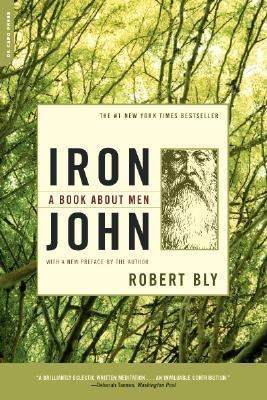Iron John: A Book About Men, by Robert Bly
 There is a lot to unpack from this book. On the surface, Iron John is a richly symbolic analysis of a pre-Christian folk tale, using Jungian psychology and a lot of references, but beyond that it is an attempt to define masculinity and what good it brings to the table and how to heal it. Robert Bly started a "Mythopoetic men's movement" with this book that lasted (only) two decades in the United States. Some of the things he says apply eerily well to the present.
There is a lot to unpack from this book. On the surface, Iron John is a richly symbolic analysis of a pre-Christian folk tale, using Jungian psychology and a lot of references, but beyond that it is an attempt to define masculinity and what good it brings to the table and how to heal it. Robert Bly started a "Mythopoetic men's movement" with this book that lasted (only) two decades in the United States. Some of the things he says apply eerily well to the present.
The book is hard to describe. It's filled with unexpected connections between concepts, complete with references to philosophical works and poems, books and movies, mysticism and real events. The thing that it most reminded me of was the text the main character reads in House of Leaves. It was a text analyzing a video, but in such intricate detail: the sound, the frames, the hidden meanings, with scientific and cultural references linked to every little thing, that it becomes a larger and deeper work than its subject. This is an analysis of a fairy tale - itself a distillation of mythology, ritual and collective subconscious - with minute attention to details that, honestly, I would have never even thought about. Some of the associations the author made felt really far fetched. I've seen people who make weird associations like that and they are either very mystical, schizophrenic or both. That made the read a bit difficult.
I found it strange that Bly was talking about the societal malaise that turns sex against sex and the forces that try to convince men that they are toxic, useless and guilty, but he was doing it in 1984, when this book was first published. Now, 40 years later, that's weirdly prescient. He also makes some really good points about the role of the father in the family and society, the need for rituals that people have had since times immemorial and now abandoned or even shunned by modern culture, how we must recognize and embrace our feminine and masculine sides, our light and dark sides, respect the stages of evolution and maturity of the individual, family and society and so on.
Yet at the same time it feels like an alchemical treatise, a book about tarot cards with deep meaning, ways to transmute copper into gold using mercury and ash, only psychologically rather than literally. I didn't know Bly was a poet, but it makes a lot of sense. He was presenting some ideas and to drive them in he would quote from some poem or another, but in a strange way, like a scientist would quote from science papers, poetry as source of truth. I got the feeling that for him reality had a much deeper meaning than for me, and that meaning may or may not have been purely imaginary. The alternative would be that he was talking about a truth I can't even perceive in myself.
Anyway, I feel this review would never make justice to the book. It was both intriguing and annoying, eye opening and eyebrow raising, meaningful and meaningless. Magic made temporarily real through Jungian psychology. I suggest you read it, but take from it what you need rather than seek a general approval or dismissal verdict.
Comments
Be the first to post a comment